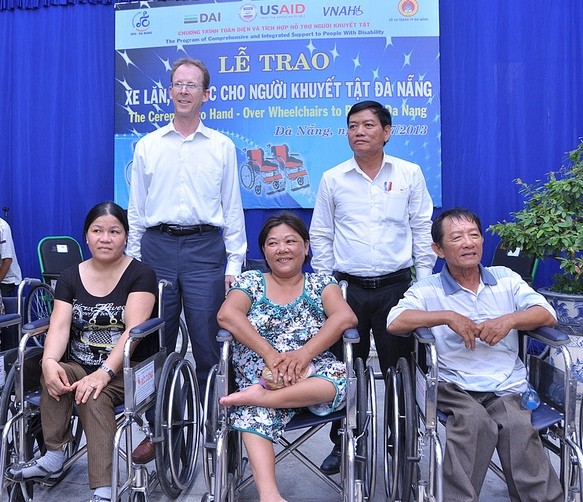
For Immediate Release
DANANG, July 16, 2013 -- The Danang Women's and Children's Hospital today opened a new rehabilitation department for children with support from a U.S. Agency for International Development (USAID) program for people with disabilities (PWD).
"We have been planning this new department for the past two years and sent two of our staff technicians for specialized training in pediatric rehabilitation training in Ho Chi Minh City," said hospital vice director, Dr. Le Thi Thanh Xuan. "With the equipment provided by USAID, the new department is now ready for operation to serve the children in need."
The new department at Danang's largest pediatric hospital helps provide convenient rehabilitative care for small children. Until now, parents have had to take their babies to other hospitals for rehabilitation, which is time-consuming, costly, and sometimes dangerous for young patients traveling by motorcycle. Many families have been unable to receive timely rehabilitation for their children because of obstacles in transportation and scheduling appointments.
USAID's support to the department includes safe, padded equipment to enable staff to provide physical therapy to young children, tools to strengthen hand muscles and improve fine motor training, machines for measuring oxygen levels in blood, and other items.
The USAID-funded project also presented wheelchairs to 69 people with disabilities at an event organized today by the Danang Department of Labor, Invalids, and Social Affairs (DOLISA) and the Danang Disabled People's Organization.
"USAID is pleased to support these initiatives in partnership with local authorities and organizations committed to disabled people's interests," said USAID Mission Director Joakim Parker. "We share the objective of greater inclusion for people with disabilities by supporting the health care system and capacities to live happier and more productive lives."
The wheelchairs are one type of direct assistance to people with disabilities being provided by the USAID disability support program, and will enable their recipients greater mobility to carry out their jobs and other daily activities. Other direct assistance will include hearing aids, corrective surgeries, vocational training, and other health, education and social services. More than 1,000 PWDs have benefited from the program since its launch in October 2012.







Comment
Make a general inquiry or suggest an improvement.